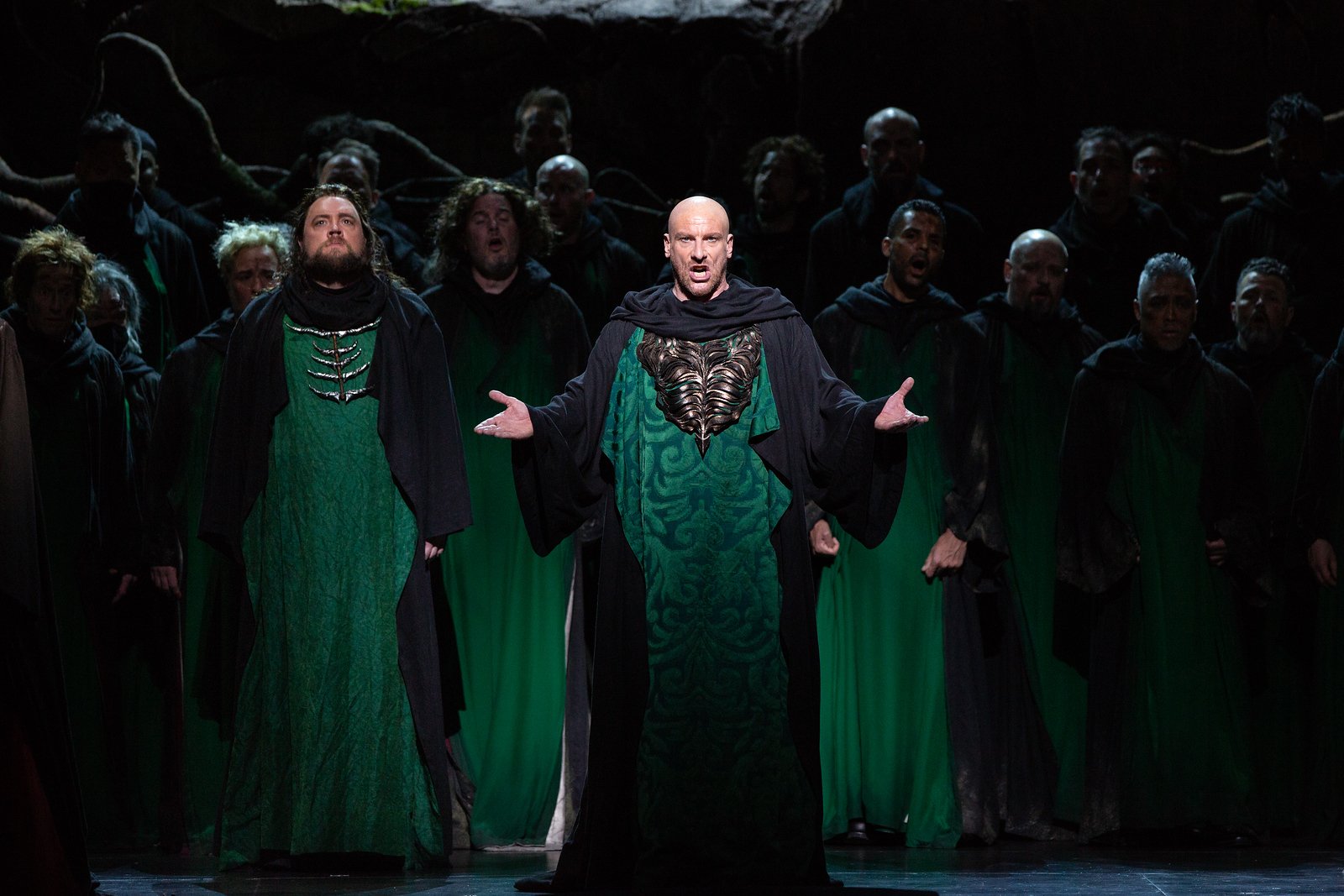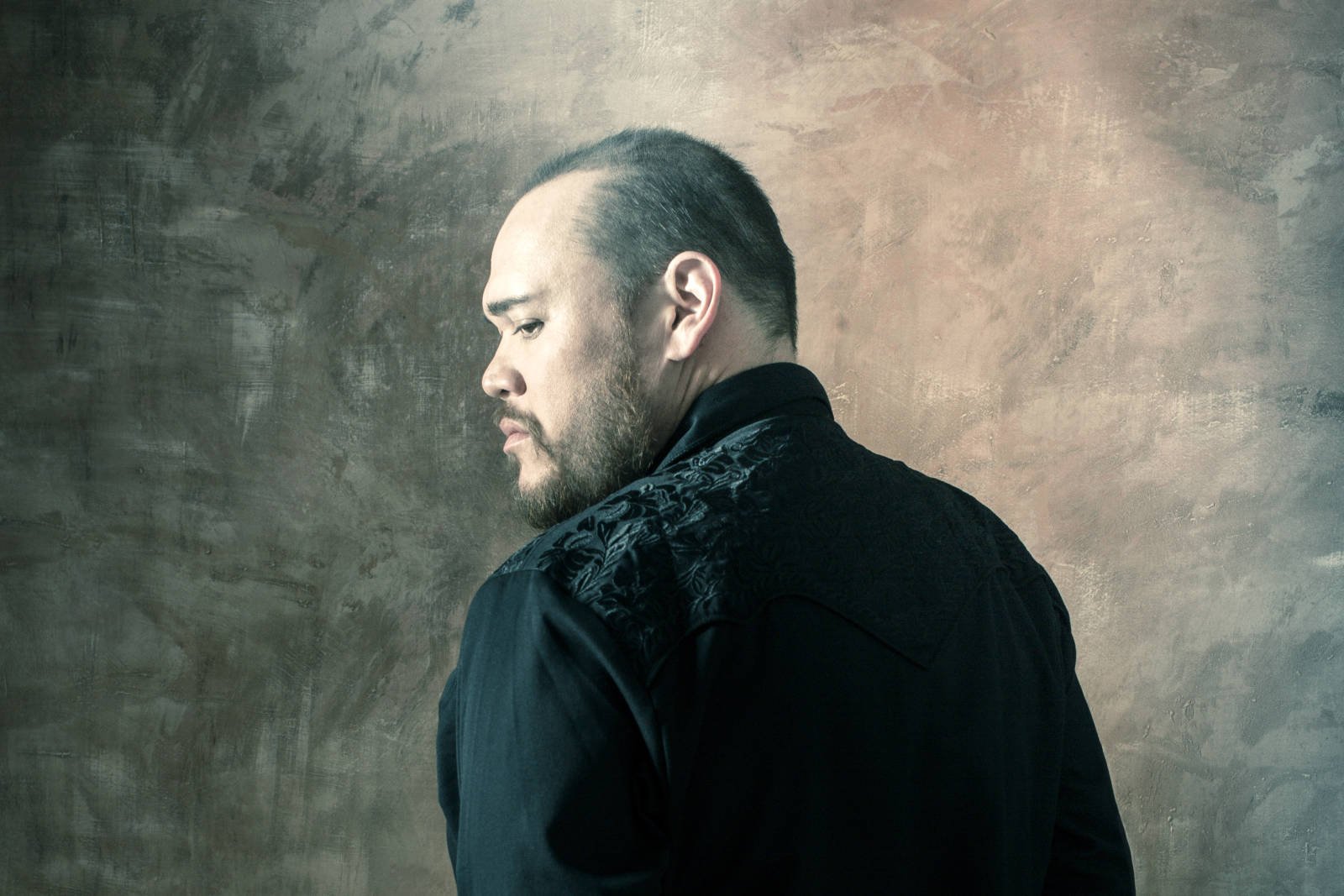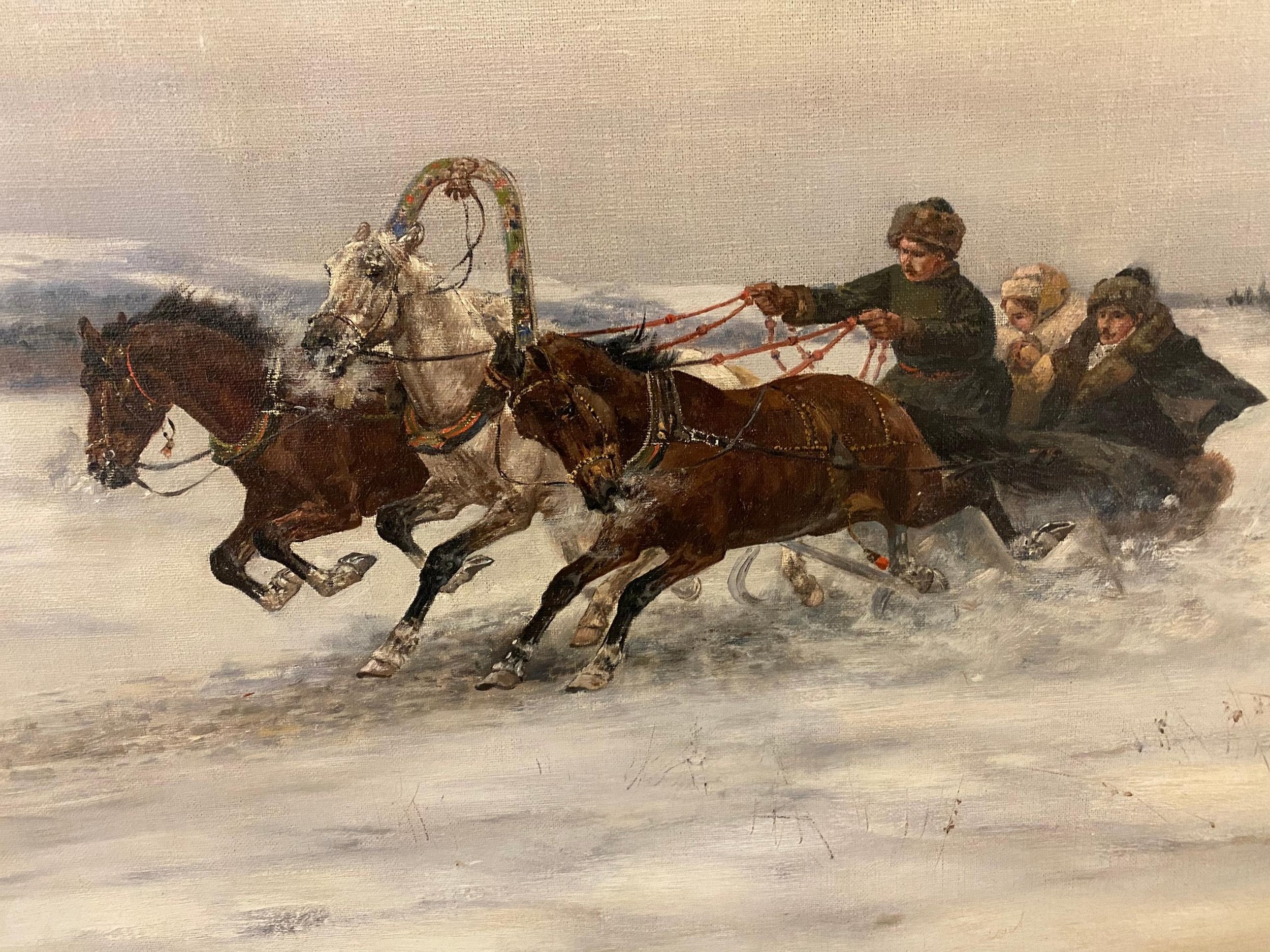Met Opera 2022-23 Review: Lohengrin
Piotr Beczała as Lohengrin
After closing night of the delicious comedy Falstaff in the afternoon, Wagner’s nearly 5-hour medieval romance Lohengrin was next in my weekend marathon. This was my first full in-person Wagner opera; I confess my little knowledge of his “romantic” works. I had, however, seen Acts 2 and 3 of Die Walküre in a concert version at Tanglewood, which also starred the superb Christine Goerke.
The colorful and evocative production was a new one by François Girard, whose contemporary production of the prequel Parsifal debuted in 2013 to great acclaim, although the sea of blood kept me away from the 2018 revival. There are continuities in the productions, but as I hadn’t seen Parsifal and this Lohengrin is generally traditional, I couldn’t connect the dots. I found the projections on the “sky” — a hole in a stony wall over the stage — fascinating at the beginning, especially the image of the swan’s wing over the moon, but they later became too much, distracting from the singers while seeming mostly irrelevant to the action. Never mind the bewildering green egg yolk-y image.
The only part that connected to the onstage action was the color; the galactic projections changed according to who was singing (or being sung about). The costumes reflected this too. Lohengrin and Elsa wore white, Ortrud and Telramund wore red, King Heinrich wore green, and the chorus and Actors were able to change the color of their robes at will. It was interesting, and when the capes were white, they lit up the stage. I liked a part in Act 2 when the half dozen Actors at the front turned around, capes awhirl. While the device may have been a touch overused, it was oddly mesmerizing at times.
The set and tree roots (?) looked pretty cool. It gave me Lord of the Rings vibes — or were they reminiscent of Star Wars?? You tell me; I wouldn’t know anything about it. Both?
Update, January 28, 2025. Having now seen both of the abovementioned sagas, the vibes were definitely Star Wars.
Piotr Beczała, Elena Stikhina, and the Met Opera Chorus in Lohengrin (Marty Sohl/Met Opera)
Piotr Beczała’s voice is lyrical and sweet, capable of both floating softness and hefty fortes, and he displayed both as the titular swan knight, from his tender “Nun sei bedankt” (a short entrance monologue) all the way to “In fernem Land” at the end. The stellar Polish tenor is known far more for Italian roles than Wagner, although he insists on maintaining a balance. His Lohengrin was clearly the outsider, cemented visually by his contrasting costume (a white dress shirt, as opposed to the vaguely medieval outfits of the rest of the cast). Lohengrin was never impulsive; even his walk was slow and deliberate. He was unfailingly gentle towards Elsa but commanded respect from all (although Piotr remarked to me afterward that the character is “a loser”).
As the maiden Lohengrin rescues, then weds, Elena Stikhina was excellent. She convincingly portrayed Elsa’s purity with a winning mildness both in her pretty, smooth voice and in her soothing presence. She’s singing three lead roles at the Met next season — Amelia in Un Ballo in Maschera, Leonora in La Forza del Destino, and Mimì in La Bohème — and her performance was such that I could see why.
Update: Stikhina withdrew from Ballo in August 2023 and was replaced with Angela Meade.
As Ortrud, Christine Goerke was a force to be reckoned with. Her dark-hued sound whizzed through the house like a rocket of steel, and her thrilling showstopper “Entweihte Götter” froze me in place. Even when she was not singing, she owned the stage — muttering, conjuring invisible sorcery, making “crazy hand gestures” (her words), all of which I loved. Critics complained about how unsubtly the director had Christine play the character. Me, I thought it fit Ortrud perfectly — she’s a witch, for Freia’s sake! — and Christine made it feel real, immediate, compelling. One of many riveting moments came in Act 2, when Telramund uttered the word “God.” “God?” thundered Christine. I was close enough to the stage to hear Ortrud’s gasps for air. She looked afraid. Then she cackled. It gave me chills.
Christine Goerke with the Met Opera Chorus and Piotr Beczała (in white) in Lohengrin (Marty Sohl/Met Opera)
Thomas Hall took over the role of Friedrich von Telramund, Ortrud’s disgraced and easily manipulated husband, from an indisposed Evgeny Nikitin. I was glad. I hope Nikitin is feeling better by now, but I didn’t want to hear him sing — he has sung multiple times at the pro-Putin Mariinsky Theatre in Russia, conducted by Putin devotee Valery Gergiev. That wasn’t the only positive that came from Hall’s stepping in, though; he sang stoically, powerfully, and persuasively as Telramund.
Gunther Groissböck cut an authoritative figure as King Heinrich and coolly handled the role’s gnarly low notes. Heinrich’s Herald, Brian Mulligan, was very good and his future Met career looks promising; that month, he stepped in as Faninal in Rosenkavalier, and though I didn’t see his performance, he got excellent reviews.
INTERMISSION
During intermission, I went to greet the few musicians still in the orchestra pit and chatted with a mega-Piotr Beczała fan that I’d met during Fedora. He said adamantly that Lise Davidsen should be singing “everything” but that the Marschallin was wrong for her. I pushed back lightly but decided to bite my tongue. Some people’s opinions are fixed. If you want mine: Christine is the perfect Ortrud, and although I’m quite partial to Lise, her voice is not at the point where she should sing Ortrud or Turandot — and she was a wonderful Marschallin. Happily, the subject turned to Mirella Freni’s last Fedora, and the fan told me of his intention to throw Piotr flowers at curtain call.
Back in my seat, I started talking with the operagoer in front of me, who turned out to be an intern at the Met. My eyes nearly popped out of my head when I heard all the people she runs into on a regular basis. She was so pleasant and interesting, and I hope to see her again soon!
ACT 3
Christine Goerke in Lohengrin (Marty Sohl/Met Opera)
As we wouldn’t see any more of Ortrud until the end, I enjoyed her (silent) appearance at the beginning of the act, surrounded by red smoke and concocting some dark magic. What spell was it? Theories, readers?
The choral writing of Lohengrin is superb throughout. I thought I had adjusted to opera’s top volumes during Falstaff in the afternoon, but at Lohengrin, I… unadjusted. The Chorus’s sound is absolutely colossal! I have to retrain my ears every time I go to the Met. Fear not, if my ears did not burst at a Wagner opera, they never will. It’s safe.
The Chorus was the first to sing in Act 3, chanting a blessing upon the newlywed Elsa and Lohengrin. You might recognize this Bridal Chorus as “Here Comes the Bride,” so often played at weddings. Yes, it’s pretty, but it’s a baffling choice for brides, because they evidently don’t know the fate of the lovers in the opera the song comes from. After Ms. Stikhina and Piotr sang a meltingly lovely love duet, “Das süße Lied verhallt,” Elsa worked herself up into a fit with trying to find out her swan knight’s name — the one thing she had promised never to ask. The one thing! I could tell she was going to ask, and I think Lohengrin knew it too. Well, she asked. Now all our happiness is gone, Lohengrin lamented in a near-whisper.
From left: Brian Mulligan, Gunther Groissböck, and the Met Opera Chorus in Lohengrin (Marty Sohl/Met Opera)
The projection of the swan’s wing over the moon reappeared. A new group of choristers opened their capes to white while exclaiming “Der Schwan!” - “Der Schwan!” - “Der Schwan!” The swan! Lohengrin turned and sang lovingly to the swan, the music identical to “Nun zei bedankt” at the beginning, in a high register. Before he could leave though, Ortrud stormed onto the stage and cried triumphantly, “Fahr heim! Fahr heim, du stolzer Helde!” Go home! Go home, you proud hero! Then she revealed that the swan was Elsa’s brother. “Fahr heim” is not considered an aria, but it lasted slightly longer than “Entweihte Götter” and sounded at least as difficult to me (but ask Christine, not me). One note in “Fahr heim” was even lower than those in “Entweihte Götter,” although both arias are dominated by terrifying high notes, which Christine mastered impressively.
Evidently, I missed how it happened, because Gottfried (Andrew Spriggs — welcome to the Actors!) simply appeared from one second to the next. I wished Gottfried’s costume had more to distinguish it from the choristers’. The libretto indicates that Ortrud collapses and (presumably) dies at the end, but here, she simply rushed off the stage in defeat. It didn’t provide much closure but I was secretly glad she didn’t die, even if that had more to do with my dislike of seeing my favorite singers die onstage than sympathy for Ortrud (although judging from a photo, she did die in rehearsals). I’m going to have a tough time with Lise Davidsen at La Forza del Destino next year, which will be even worse because her character doesn’t just die, she’s killed. Oh boy.
Annoyingly, I was too riveted to notice the phrase “Zum Führer sei er euch ernannt!” The word führer meant “leader” before Hitler co-opted it, but it’s frequently changed in productions. Not here, which I’m glad of. Let’s face it: Wagner was a brilliant creep who pushed German nationalism in many of his operas. Unsurprisingly, he was Hitler’s favorite composer. Don’t pretend otherwise by sanitizing his work. Even as a German, he was a troublemaker; he missed the première of Lohengrin because he was in exile for his role in the 1849 May Uprising in Dresden.
Creep or not, though, his music was gorgeous (but so complex!). Queen Victoria herself, who was no Wagner fan, loved Lohengrin’s music, and now so do I. Again, it runs just under 5 hours — and I think Wagner could have trimmed some scenes — but Piotr, Christine, and Ms. Stikhina made the time fly by.
STAGE DOOR
Me with Piotr!
My time at the stage door was brief. Christine was in a rush to make it to family dinner, which I thought was sweet (her Facebook bio reads “Dramatic Soprano & Soccer Mom…not necessarily in that order”). I told Piotr how excited I was for his Met role debut next season as Don José in Carmen (although it’s a very adult opera and I doubt my parents will let me go).
Update 2024: they did!
Gunther Groissböck was also in the middle of a run of Der Rosenkavalier, as the odious Baron Ochs, and I remarked to him at the stage door how weird it must be to be doing the vulgar Ochs and the magnanimous Heinrich at the same time. It was certainly weird for me!
I complimented Ms. Stikhina on her performance, and noticed that she came out carrying the fan’s orange roses. I was amused because the flowers had been very earnestly meant for her co-star, but Piotr, ever the gentleman, had given them to her.
Midnight was long past, and we trudged off. Though this was my first Wagner at the Met, it won’t be my last; the Met revives Der Fliegende Holländer this June, and they’re performing Tannhäuser next season (bafflingly, without Lise Davidsen. Are they saving a new production for her?). If Dr. Seuss — who was Jewish — could set aside Wagner’s virulent antisemitism, I suppose I can too. Just not on Shabbat.









